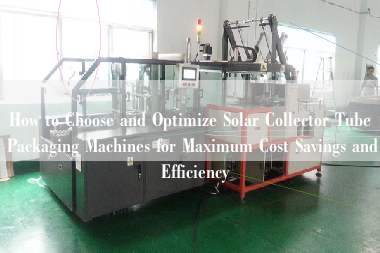The Silent Guardian: Solar Collector Tube Packaging Machines in Action
Solar collector tube packaging machines operate as critical production line sentinels, safeguarding fragile evacuated glass tubes throughout the packaging process. These specialized systems automate the handling of delicate solar thermal components with micron-level precision. Automated conveyors transport tubes into cushioned transit configurations, while robotic arms position protective foam end-caps and layered separators. Vacuum-assisted grippers prevent surface abrasion during transfer into reinforced cardboard sleeves or custom thermoformed trays. Integrated vision systems verify tube alignment before automated cartoning, with inline weight checks flagging missing components. This end-to-end encapsulation shields against vibration, impact, and environmental hazards during global logistics – directly reducing transit breakage rates exceeding 15% in manual operations.
Global Supplier Landscape: Mapping Key Solar Packaging Machine Manufacturers
The solar collector tube packaging machine supply chain spans specialized industrial clusters across three continents. German manufacturers like Bausch+Ströbel dominate pharmaceutical-grade solutions with ISO Class 5 cleanroom compatibility, commanding premium pricing for medical-grade stainless steel construction. Italian suppliers including Marchesini Group leverage modular designs allowing rapid format changeovers for variable tube lengths. Chinese producers such as Yanmao Intelligent Equipment (Suzhou) offer cost-optimized systems featuring localized service networks across Southeast Asian manufacturing hubs. North American suppliers like Douglas Machine provide regional technical support with UL-certified electrical systems compliant with OSHA standards. Each geography presents distinct advantages regarding technical specialization, compliance frameworks, and after-sales infrastructure.
Five Critical Pitfalls in Supplier Selection
Procurement teams face multiple decision-making hazards when sourcing solar collector tube packaging machines:
1. Technical Capability Gaps: Suppliers lacking vacuum handling expertise risk tube microfractures during high-speed transfer operations.
2. Delivery Timeline Volatility: Component shortages can extend lead times beyond 26 weeks, stalling production line commissioning.
3. After-Service Deficiencies: Limited regional technical support causes 3+ week response delays for critical breakdowns.
4. Hidden Cost Structures: Ancillary expenses for custom tooling, installation, or validation protocols may increase project budgets by 35%.
5. Integration Incompatibility: Machines requiring proprietary communication protocols create data silos in smart factory environments.
Third-party validation reports and factory acceptance testing remain essential verification steps before procurement commitment.

Price Disparity: Navigating the $28K to $280K Quotation Maze
Solar collector tube packaging machine quotations reveal extreme volatility, with baseline models starting near $28,000 and premium configurations exceeding $280,000. This 10x price differential stems from three primary variables: regional manufacturing costs, automation density, and material specifications. German-engineered systems incorporate medical-grade 316L stainless steel frames and ISO-certified cleanroom components, justifying 45-60% cost premiums over Asian alternatives. Modular Italian designs with quick-change tooling command 25-35% higher pricing than fixed-format machines. Chinese manufacturers like Yanmao Intelligent Equipment leverage localized supply chains to offer robust 304 stainless steel systems at competitive rates. Automation level critically impacts budgets – semi-automatic feeders reduce initial investment by 40% but increase long-term labor expenses. Optional upgrades like robotic vision inspection or AI-driven defect detection add 15-30% to base prices. Energy consumption profiles vary significantly; servo-driven models consume 18kW/hour versus 32kW/hour for pneumatic alternatives. Comprehensive price comparison must evaluate operational expenditure alongside capital investment.
Cost Architecture: Engineering Economics Behind Steel and Gears
Material selection dominates 55-70% of solar tube packaging machine manufacturing costs. Structural components utilizing 304 stainless steel average $8.50/kg, while corrosion-resistant 316L grades escalate to $14.20/kg. Precision planetary gearboxes account for 12-18% of total expenses, with European-made units costing 2.3x Chinese equivalents. Control systems reveal stark contrasts: Siemens PLCs add $7,200 per unit versus $2,800 for domestic alternatives. Conveyor subsystems consume 22% of budgets, where food-grade polyurethane belts command 40% premiums over standard rubber. Labor constitutes 15-25% of final pricing, with German engineering hours billed at €120 versus ¥300 in Suzhou facilities. Certification compliance creates hidden expenses – CE marking adds $9,500 while UL certification requires $14,200 in testing fees. Total cost of ownership calculations should incorporate maintenance cycles: premium bearings last 20,000 hours versus economy versions requiring replacement at 8,000 hours.
Negotiation Breakthrough: Renewable Energy Firm’s Procurement Victory
A Southeast Asian solar manufacturer achieved 31% cost reduction through strategic procurement tactics during their packaging automation overhaul. Facing initial quotations ranging from $186,000 to $274,000 for tube handling systems, the procurement team implemented a four-phase approach. Phase one involved requesting itemized cost breakdowns from three shortlisted suppliers, revealing 42% price variation in structural components alone. Phase two leveraged volume commitment: bundling tube packaging machines with robotic palletizers secured 18% discount from Yanmao Intelligent Equipment. Phase three negotiated payment terms, with 40% upfront, 30% upon factory acceptance testing, and 30% post-commissioning. Phase four established a five-year service agreement at fixed annual rates, eliminating surprise maintenance costs. The renegotiated $128,000 solution incorporated ISO-certified stainless steel construction, vision-guided robotic insertion, and remote diagnostics – achieving ROI within 14 months through 24/7 operation with two-shift labor reduction.
